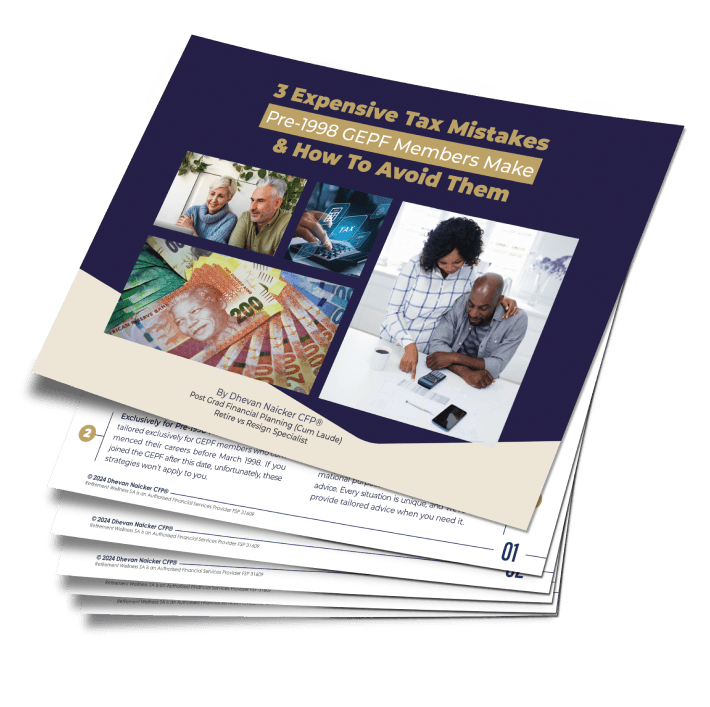Imagine waking up to an email from someone you’ve previously helped—a government employee named Musa—only to discover he’s suffered a devastating financial loss of over R250,000. This recently happened to me, and it deeply reminded me of my own family’s painful financial experience. Losing money unnecessarily is something that hits close to home.
As a specialist advising government employees on whether to retire or resign, my goal has always been to empower you with knowledge, flexibility, and control over your financial future. Musa’s story, however, highlights a critical issue: not every financial advisor or planner has your best interests at heart.
Today, I want to share important lessons from Musa’s experience, offering practical steps to evaluate your financial advisor and safeguard your investments.

1. Treat Your Relationship with Your Financial Advisor as Long-Term
When you’re transitioning from your pension fund to an approved fund upon resignation, it’s initially an intensive process:
- Funds must be transferred
- Tax calculations are crucial (especially considering pre-1998 service)
- Investments must be carefully selected
Initially, regular meetings and detailed planning are critical. But once set up, it becomes simpler, focusing primarily on managing your income and investments. It’s vital, therefore, to view this as a long-term relationship rather than a one-time transaction.
A consistent relationship ensures:
Accountability: One advisor takes responsibility from start to finish.
- Stability: Long-term strategies are regularly reviewed and adjusted appropriately.
- Trust: You build mutual understanding, making financial decisions less stressful.
2. Always Share Your Concerns Openly
Transparency and open communication are essential. No advisor can read minds. If something doesn’t feel right:
- Immediately raise your concerns.
- Ask questions for clarity.
- Request alternative options if you’re uncomfortable.
Remember, it’s a partnership. Effective communication ensures problems are addressed proactively, keeping your financial journey smooth and stress-free.
3. Look Before You Leap
Before switching financial advisors or investment plans, conduct thorough due diligence. Never make impulsive moves without proper evaluation. Specifically, consider:
- Tax Implications: Compare potential tax impacts between your current and proposed plans.
- Investment Structure: Evaluate exactly where and how your money will be invested.
- Cost Structure: Analyze fees, charges, and administrative costs.
- Past Performance: Look at track records and client testimonials.
Always ensure the new advisor provides comprehensive written justification for any recommended changes. If they can’t, reconsider your move.
4. Ensure Advisor Accountability
Your financial advisor should willingly accept full accountability. This means:
- Clearly explaining decisions and their implications.
- Being transparent about fees and commissions.
- Openly accepting responsibility for results.
Financial planning involves trust, and accountability is foundational to maintaining that trust.
5. Analyze, Don’t Emotionalize
Financial decisions should never be based purely on emotions or impulse. Instead:
- Take the time to thoroughly analyze data and performance.
- Compare plans objectively rather than emotionally.
- Seek out client reviews, testimonials, and independent feedback.
Making decisions based on solid data rather than emotions can significantly minimize risk and increase your chances of long-term financial security.
Conclusion
Musa’s unfortunate loss of R250,000 is a powerful reminder of why proactive, informed financial planning is crucial. Your retirement or resignation process is not just a financial event; it’s a pivotal life transition.
By treating your financial advisor as a trusted long-term partner, openly communicating concerns, carefully evaluating proposed changes, ensuring accountability, and making informed, unemotional decisions, you can significantly protect yourself against financial losses.
Remember, informed decision-making is your best protection. If you found this helpful, share your key takeaways in the comments.
Disclaimers:
- Retirement Wellness SA is an Authorised Financial Services Provider (FSP 31609). This article provides information, not direct advice.
- This information is not provided by or on behalf of the Government Employees Pension Fund (GEPF). We do not act on behalf of the GEPF.

